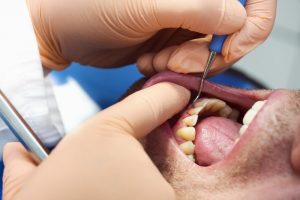
Did you know that 47.2% of American adults over age 30 have an advanced form of gum disease? That’s roughly 64.7 million adults with a condition with potentially serious repercussions. So what is gum disease? How does gum disease impact your overall health? What is the process of getting gum disease treatment? How can it be prevented? Get the answers to all your questions here with this helpful information during National Gum Disease Awareness Month.
Signs and Treatment of Gum Disease
A chronic inflammatory condition in the gums, gum disease results from the harmful bacteria in plaque. These bacteria produce acids that irritate the gums and attack the connective tissue between them and your teeth. Some common symptoms of gum disease include the following:
- Red, swollen gums.
- Bleeding gums.
- Constant bad breath.
- Receding gums.
- Pus in between teeth.
- Changes in your bite.
- Loose permanent teeth.
If you experience any of these symptoms, you should contact your dentist in Aurora for gum disease treatment. For gingivitis, the first stage of gum disease, a routine cleaning is enough to treat and reverse any damage done. Periodontitis requires more intensive treatment, including scaling and planing, which entail deep cleaning above and below the gum line and smoothing out the exposed roots to avoid future plaque accumulation.
Effects on Your Mouth
Don’t let the name fool you. Gum disease affects more than just your gums. During more advanced stages, your gums start to recede from your teeth, forming pockets where plaque and food particles can build up. The acids then attack and degrade your teeth’s supporting tissues and bone, causing permanent damage. This makes teeth feel loose and your bite less solid and more susceptible to movement. If left untreated, eventually gum disease can lead to tooth loss.
Effects on Your Body
Gum disease has been linked to many medical conditions that affect the rest of the body. For instance, studies have shown that those with gum disease are more likely to get heart disease. People with poorly managed diabetes have been found to struggle with gum disease more often and more severely. Also, those with gum disease combined with kidney disease have a higher likelihood of death than those with kidney disease alone. These associations make sense when you realize that the bacteria in your mouth can find their way into your bloodstream, carrying them throughout your body.
Importance of Preventive Care
The good news is that gum disease is preventable! And what’s more, the care that prevents it is simple to implement into your life. At home, you need to brush at least twice and floss at least once every day. In addition, you need to visit the dentist twice a year for checkups and cleanings. These appointments are meant both to catch existing problems early and to avoid oral issues in the future. Whatever inconvenience these seemingly small tasks present is worth the time and effort to stop gum disease before it has a chance to cause serious, permanent damage.
In the end, you don’t have to be part of these sad gum disease statistics. You can receive the treatment you need to restore your oral health and get back on track. By taking a more preventive approach with healthy oral habits, you can help your gums, teeth, and body remain strong for years to come. For more information about gum disease, treatment, or preventive care, contact your dentist.
About the Practice
D’Amico & Mauck, DDS invests in the newest and best technology—including dental lasers, digital X-rays, air abrasion, and more—every year to ensure that patients receive the best treatment that dentistry has to offer. Dr. Matt Mauck and Dr. Andrew Ricci have years of dental experience and can help patients of all ages with comprehensive care. To contact them for an appointment, you can call (303) 745-1400 or click here.
